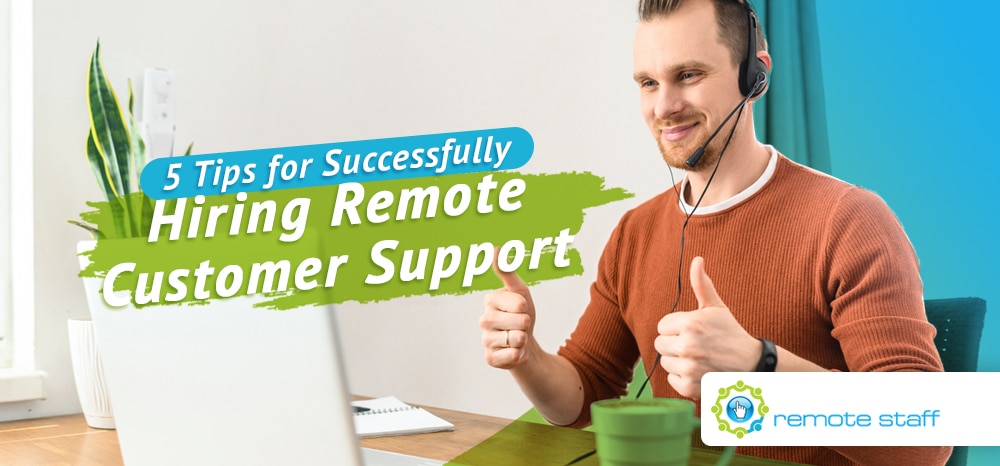Customer support is one of the few areas in which small businesses can have the edge over their bigger competitors. Why? Well, we all know that satisfied customers tend to be repeat customers as well. And thanks to their size and flexibility, small businesses can cultivate a unique brand of customer service that results in exactly that.
However, let’s not kid ourselves. When you’re a small business owner starting out, you don’t have the luxury of personally seeing to all your customers’ concerns. No, you’ve got to carry out various functions like bookkeeping, overseeing staff, and most importantly, expanding your business on top of that.
Thankfully, that’s what outsourcing is for. Remotely hiring customer support is not only cost-effective. It also gives you access to a wider pool of talent that goes beyond geographical borders.
Filipino customer support representatives, for instance, are known to be the best in the remote work world. Their remarkably fluent English language skills, neutral accent, and culturally-ingrained hospitality has made them the secret weapon of many small businesses all over the globe.
So, now, the question is, how do you go about hiring a customer support rockstar for your team? Here are a few tips to bear in mind:
1. Emphasize the remote nature of the job in the job description.

Not everyone is suited for remote work, even if they have a wealth of customer service experience. A remote position will demand high levels of personal management skills (more on this later) and can be very isolating. Even the most perky customer service rep might flounder if they’re used to working alongside a team in a physical location.
For example, indicate that experience in working remotely is a huge plus in the job description. You can also state that meetings are kept to a minimum, and that the people on your team often work independently.
2. Pay extra attention to their communication skills.

This is the very crux of the job. Poor communication skills should be an automatic deal breaker.
Furthermore, you should assess a candidate’s oral and written communication skills. What language and tone do they use? Do they get to the point right away? Or do they tend to beat around the bush? Do they format their text properly?
Related read: Ten Customer Service KPI’s You Should Keep An Eye On (And How to Act on Them)
The bottomline is, your customer support staff should be able to address concerns, resolve problems, and provide the right information. And they should do all of that in a professional and perhaps even amiable manner.
3. Whenever possible, screen with “test projects.”

CV’s and resumes are important, but they don’t reveal much about how your candidate might behave in a potential interaction with your customers.
Test projects won’t just confirm if the candidate is a good fit for your company. They’ll also weed out the resume blasters who send their CV’s to every job opening out there regardless of how appropriate (or not) they actually are for the job.
Can’t think of one? When interviewing a candidate, provide them with a common scenario with a customer. Ask them about how they would handle the situation, and then evaluate their answer.
4. Allot interview questions for assessing their ability to manage themselves.

Speaking of interview questions, don’t just focus on their ability to do the job. As we mentioned earlier, personal management skills are just as important for a remote position like this.
Obviously, you should ask about how they keep themselves productive. Do they have any morning rituals to help them stay focused? How do they deal with distractions? What’s their work environment like at home?
Inversely, inquire about how they wind down too. Remote work makes it all too easy to keep working since the boundaries between work and home blur. However, rest is important as it helps workers recharge and refocus.
5. Always insist on at least one video interview.

Video interviews can reveal two things about a candidate. And no, it’s not necessarily about their ability to think on their feet and to respond. (Though that’s also important in this line of work.)
We’re talking about: 1.) The stability of their internet connection and 2.) a glimpse of their working environment. So, if your candidate’s video feed keeps lagging or if you hear plenty of background noise (e.g., babies crying, dogs barking, vehicles honking), you might want to move on to the next candidate.
Lastly, make sure your company culture shines through to every aspect of hiring, from your job description to the actual onboarding process. Your customers are likely to keep patronising your company because they like your culture, so your customer service reps need to reflect that in every way possible.
For everything else, there’s Remote Staff. With over ten years of experience in the remote work industry and a rich pool of the best Filipino remote customer support talent, we can help you find the best addition to your team in no time!
Click here and let’s get started.
Serena has been working remotely and writing content for the better part of the last decade. To date, she's written for Pepper.ph and Mabuhay Magazine, among others, and has churned out more than a thousand articles on everything from The Basics of Stock Market Investing to How to Make Milk Tea-Flavored Taho at home. Hermits, aspiring hermits, and non-hermits with interesting project propositions may email her at serena.estrella10@gmail.com.





















